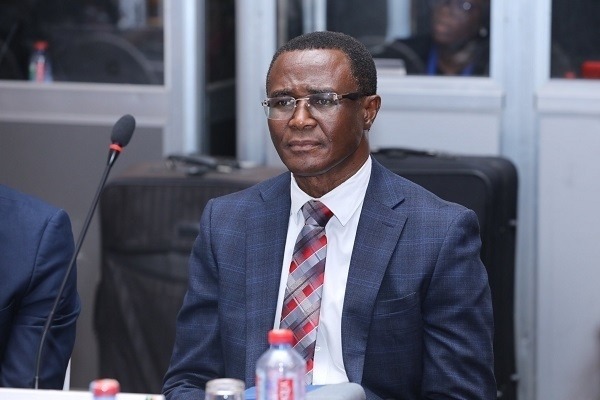3 former GRA Officials in NIB Custody over SML Scandal

Three Ex-officials of the Ghana Revenue Authority (GRA) are in the custody of the National Investigations Bureau in connection with the ongoing investigation into SML.
The three include Rev. Dr. Ammishaddai Owusu-Amoah who was the Commissioner General of the GRA, Dr. Isaac Crentsil, a former Commissioner of Customs, and Christian Tetteh Sottie, a former technical advisor to the Commissioner General of the GRA.
A report by manassehazure.com indicates that the three officials spent the night in custody after they could not secure bail conditions following the arrest and questioning by the Office of the Special Prosecutor.
Background
The SML scandal was revealed in an investigative documentary by three former reporters of The Fourth Estate, Evans Aziamor-Mensah, Adwoa Adobea-Owusu, and Manasseh Azure Awuni, after a year’s extensive investigation into the shady operations of SML.
When the journalists confronted the company with evidence, SML could not substantiate the claims it made about the services it provided and the amount of savings it claimed to have made as a result of its operations .
The company had been paid over $141 million by the government by the end of 2023 for its contracts, which have broken several laws, including the PPA Act.
SML, which is an offshoot of a timber company, was formed on Valentine’s Day in 2017, a month after the Akufo-Addo administration took office, and has since enjoyed several sweetheart deals from the GRA and the Ministry of Finance.
The SML scandal is one of the reasons the Special Prosecutor has declared Ken Ofori-Atta wanted over suspected corruption and corruption-related offences. Ken Ofori-Atta masterminded the consolidated SML contract in 2023, which entitled the company to over $100 million a year from the state. That contract was for five years, renewable for another five years.
The three former GRA officials in custody were among those questioned by the OSP yesterday in an ongoing probe into the contracts and operations of SML and the complicity of state officials. They played various roles in the SML contract, and some of them have now crossed carpets from the GRA to SML.
Dr. Isaac Crentsil, who was the GRA’s Commissioner of Customs at the time the GRA signed the contract with SML, is now the General Manager at SML.
He was the GRA’s Commissioner of Customs from 2017 to 2019 and was seconded to the Ministry of Finance as a technical advisor until his retirement from the GRA in September 2022. Before becoming the Commissioner of Customers, Dr. Crentsil had headed the Post Clearance Audit Unit of the Customs Division of the GRA from 2015 to 2017.
Dr. Isaac Crentsil, a former Commissioner General of the Customs Division of the Ghana Revenue Authority and current General Manager of SML
Christian Tetteh Sottie, who was the technical advisor to the GRA Commissioner General at the time of the SML contract, is now the Managing Director of SML.
Also, a former head of legal at the GRA, Philip Mensah, now works with SML as the company’s legal advisor.
Another former Commissioner of the GRA, Emmanuel Kofi Nti, was also questioned by the OSP, as well as Evans Edusei, the CEO of SML.
See also Ransford Gyampo called and texted OSP during raid on SML—OSP reveals
It was during Kofi Nti’s tenure as the GRA’s Commissioner General that the SML deal was first cooked. On three separate occasions, Mr. Nti applied to the Public Procurement Authority (PPA) for approval to use the single-source procurement method to engage Strategic Mobilisation Enhancement Limited (SMEL) for audit and revenue assurance services for the GRA.
On each of the three occasions, the PPA denied the request, stating that SMEL did not have the capacity or any proven record of ever undertaking that service.
SMEL changed its name to SML, but did nothing about its smell of apparent incapacity, for which reason the PPA denied GRA’s request. The GRA proceeded to award the contracts without PPA approval.
Mr. Kofi Nti, who is reported to have appeared at the OSP looking frail, was succeeded by Rev. Dr. Ammishaddai Owusu Amoah.
Rev. Dr. Ammishaddai Owusu Amoah was the one who ratified the SML contracts that were signed without regard to the PPA law. It was during his tenure as Commissioner General that the GRA and Ministry of Finance, on the orders of Ken Ofori-Atta, signed the consolidated contract of 2023 that expanded SML’s operations to cover the mining sector, upstream petroleum sector in addition to the company’s shady operations in the downstream oil production sector and the ports.
Rev. Dr. Ammishaddai Owusu Amoah, according to his LinkedIn profile, “has worked previously as the Managing Director and CEO of Bank of Africa in Tanzania. He has over 20 years of experience in Banking, having served in various roles. Previously, he served as the Managing Director and CEO for UniBank in Ghana for 4 years, and also Group Head of Operations for Ecobank Transnational Inc.”
The SML Scandal
PPA denied GRA the use of single source approval for the SML contract
As of December 2023, the government had paid more than $141 million to SML through its contracts.
In 2023, the Minister of Finance, Ken Ofori-Atta, directed that the scope of SML’s contract be expanded to cover the mining sectors and upstream petroleum sectors.
The contract, worth more than $100 million a year, was for an initial period of five years, subject to another five years’ renewal. It is worth more than $500 million for the first five years.
Under that deal, SML is entitled to a percentage of revenue from every litre of petroleum product one buys in Ghana. The company is also entitled to a fixed percentage of revenue from every barrel of oil produced in Ghana and a fixed percentage of revenue from every ounce of gold mined in Ghana.
It is, therefore, false the claim by SML and its defenders that the company is paid based on the recoveries it helps the government to make. The company has not made any recoveries since its operations.
Following the investigation by the three journalists and subsequent report by KPMG, the upstream and mining sector contracts have remained suspended. The government also cancelled the external price verification and transaction audit services at the port, which the KPMG report said were already being performed by the GRA.
SML, however, resumed its downstream operations in late June 2024. The then flag bearer of the NDC, John Mahama, said in 2024 that the SML deal was a fleecing of the state and indicated that an NDC government under his watch would terminate it. Six months into office, Mr. Mahama has yet to take any action on the contract.
See also MANASSEH AZURE AWUNI WRITES: Attorney-General’s lies.
SML has, however, embarked on an aggressive PR campaign, buying airtimes and appearing on platforms created by the University for Professional Studies-Accra (UPSA) to make false claims it could not sustain when the journalists confronted it with evidence.
SML had made false claims about its services to the state and the savings that resulted from its operations. When the journalists confronted the company with evidence, it admitted the falsehood and proceeded to delete information from its website.
First, the company had claimed that it saved the nation GHS3 billion as a result of its operations. The story had been widely published by the Ghanaian newspaper and made it to the front page of the state-owned Daily Graphic.
The investigation proved that this was false. When confronted, the Managing Director of the Company, Christian Tetteh Sottie, admitted the information was false. He claimed the media got it wrong.
When reminded by Manasseh that the same information was on SML’s website on the morning of the interview, Mr. Sottie claimed, “I don’t know about any website matter.”
Pages 157 and 158 of the KPMG report, which was commissioned by Akufo-Addo after the investigative journalists’ report indicated that SML played no role in the increase in volumes or revenue in the downstream sector during its operations.
For instance, the GRA and SML claimed that the downstream petroleum sector started recording high volumes of up to 400 million litres a month because of SML’s operations. However, the KPMG report shows that that figure was already being recorded in 2019, and that SML recorded the lowest figures when the company came on board.
Page 157 of the KPMG report debunks claims by the GRA and SML that the downstream sector started to record 400 million litres of petroleum products a month following SML’s operations, which started in June 2020
The KPMG report also indicated how revenue in the sector grew, and that had nothing to do with SML’s operations.
Page 158 of the KPMG report detailing factors that influence revenue growth in the downstream petroleum sector.
The company also made false claims about the services it rendered as part of its petroleum downstream contract.
On its website, SML stated: “The SML Digitalisation of downstream petroleum product measurement has stem(sic) the tide of under-reporting, diversion and dilution of fuel products and general non-compliance in the petroleum industry sector.”
The three journalists obtained evidence that the services used to curtail these irregularities in the downstream petroleum sector were performed by separate companies already engaged by the state. SML was not one of the companies that performed these services.
When they confronted the GRA, it said SML’s claims were false. When they confronted SML, the company admitted the falsehood.
“Oh no, we are not involved in diversion. We are only at the depots. If the thing [petroleum product] is lifted, we don’t know if [it is diverted],” Mr. Sottie said.
He added: “It is GRA, Customs, that will determine where it goes, and they will follow up. We are not capable. We don’t have men outside.”
A few hours after the interview, the claim of providing services that checked dilution, diversion, and under-reporting disappeared from the website of SML.
When the falsehood was put to SML’s Director of Support Service, Serwaa Yaa Sarpong, she said on Newsfile that the claim on the website was only an advertisement of the company’s services.
“It [the website] is a place where brands or companies advertise what they can do. They create brand awareness. They interact with their clients. They tell potential clients, ‘This is what we do.’ It’s not the scope of work of a contract.”
This was obviously false. SML admitted during the investigation that it did not have any other contracts apart from its contracts with the government of Ghana.
The company was engaged by only the GRA and the Ministry of Finance for only one downstream contract, which is the so-called digitalisation of the downstream sector. It had no prior experience in such service anywhere and at the time of the investigation, it had no such contract with any entity apart from the government of Ghana.
So, if it claims it had stemmed the tide of under-reporting, diversion, and dilution, it was not speaking in general terms. Neither was it referring to a different contract than its downstream contract with the Ministry of Finance and the GRA.
By admitting that it did not check under-declaration, diversion, or dilution, it is difficult to say which problem SML was brought in to resolve.
Officials of SML and their defenders—notably some professors of the University of Ghana and UPSA—have often claimed that those who oppose SML’s operations were companies affected by the company’s work.
The Managing Director of SML, Christian Tetteh Sottie, admitted on camera that since the company started operations in 2020, it had not flagged even a single anomaly. He further stated that SML was not into checking irregularities or noncompliance. That, he said, was the work of the GRA.
So, if a company does not check irregularities and non-compliance, how could its work affect shady players in the industry? Nobody has been able to say how.
But that was not all the shocking revelations of the SML deal.
SML said it measured the volumes of petroleum products pumped from the tank farms to the loading gantries, where oil marketing companies (OMCs) load with their tankers for the filling stations.
The the three journalists investigation revealed that the measurement by SML was not used by the GRA or the National Petroleum Authority (NPA) for revenue purposes.
SML’s engineers admitted on camera that the existing metres, which are calibrated by the Ghana Standards Authority every six months, take more accurate readings than SML’s metres. Readings from these metres were used to collect revenue before the SML contract was signed are still the ones used five years after the SML contract.
SML’s engineers explained why their metres did not take readings that were as accurate as the existing metres. They said the SML metres use sound technology and can sometimes record vibrations that are not petroleum products flowing through the pipes. This could be air being pumped to clear the pipelines.
The NPA and GRA use the readings from the existing metres, which are fed into the Enterprise Relational Data Management System (ERDMS). The ERDMS is used by all players in the industry and can lock out OMCs that default in taxes from loading. It helps the GRA to monitor all volumes of petroleum product, a reason players in the industry say SML was not needed in the first place.
The ERDMS is connected to the Customs Integration Management System (ICUMS).
This means that the systems in the downstream sector communicate with the GRA’s system, but SML’s readings are not connected to either the NPA or GRA system.
In communicating the findings of the KPMG report to Ghanaians, the Office of the President said in 2024 that the SML contract had breached several laws of Ghana, including lack of parliamentary approvals for multi-year contracts awarded to the company.
Files from: manassehazure.com



